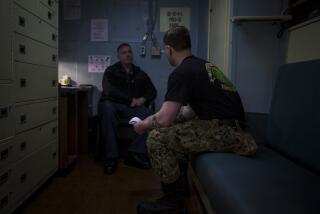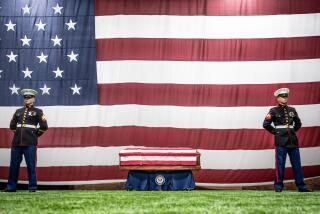Wrapped in Prayer and Hugs, Marines Leave for Iraq Duty
- Share via
CAMP PENDLETON — After the final goodbyes had been said and the gear stowed aboard the truck, there was time Sunday morning for a prayer -- not the first and certainly not the last.
Navy Lt. Jim Peugh, a Protestant chaplain, led the 100-plus Marines of Combat Logistics Battalion 5 in a prayer asking God to “be with us” as the battalion returns to Iraq and also to protect the families left behind.
Peugh has an ambitious goal for the seven-month deployment in the Al Anbar province, an insurgent stronghold.
“Our goal is to do a prayer every time a convoy is set to leave the wire,” said Peugh.
Leave the wire. It’s Marine jargon for venturing outside the relative safety of bases where the perimeters are heavily guarded, in part by multiple strands of razor wire.
The Marines who left Sunday are not infantry troops. In theory, their jobs should be safer than most. But the war in Iraq follows no established theory.
To fix generators, repair vehicles, deliver supplies and make sure communication systems are functioning, the Marines will need to travel in convoys on busy roads where hidden bombs and suicide cars await.
The Marines know the dangers of leaving the wire, and so do their families.
“Anytime I leave the wire, I’m going by helicopter,” Lance Cpl. Perry Schultz, 20, assured his wife, Shawna, 19. He’s a generator mechanic.
“You need to be strong and you need to pray that they’re all coming back, all of them,” said Bev Singleton, the mother of Staff Sgt. Mikel Travis, 30. “These are all my sons and my daughters, every one of them.”
Even before the chaplain’s prayer, families huddled together in the wet, cold parking lot and asked for divine assistance.
“We just want him to be safe, that’s all,” said Miranda Garcia, 21, whose husband, Lance Cpl. Trey Garcia, 22, is a diesel mechanic.
Some of the prayers and goodbyes were in Spanish. The Marine Corps has a 24-hour hotline with Spanish-speaking operators to help Marine families from homes where Spanish is the dominant language.
It was a morning for spouses to trade secrets on how to endure the uncertainty of the deployment. For some families, it was the third time they’ve been separated.
“Don’t watch the news, be hopeful when he calls and don’t bother him with problems. Just give him positives,” suggested Carrie Strickland, 21, whose husband, Sgt. Chris Strickland, 23, is an explosive ordnance technician.
Megan Platenik, 23, said she is eager to know how to cope while her husband, Pvt. Joshua Platenik, 24, is in Iraq.
“If you find out the secret, please tell me,” said Platenik, her eyes red-rimmed. Her husband, an intelligence analyst, will be gone for 12 months; the couple married in November.
By shortly after 9 a.m., as dark clouds settled over the base, the buses taking the Marines to the flight line had departed and family members drifted away to begin the long wait. Some knew their immediate destination.
“We’re going to church,” Llesenia Farias said as the bus carrying her brother, Lance Cpl. Fernando Pena, disappeared from sight.
More to Read
Sign up for Essential California
The most important California stories and recommendations in your inbox every morning.
You may occasionally receive promotional content from the Los Angeles Times.










